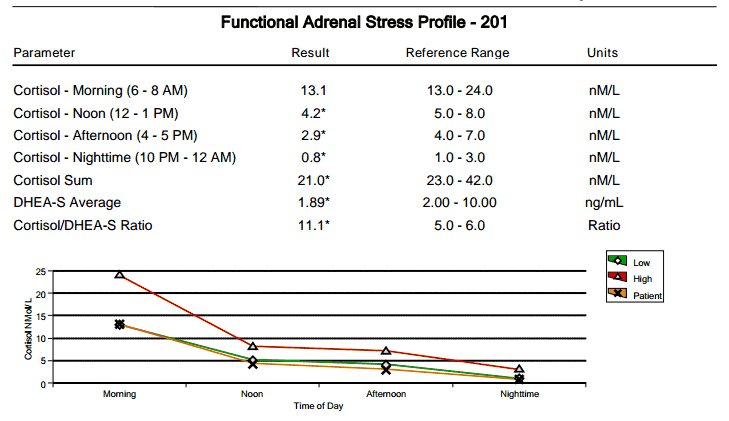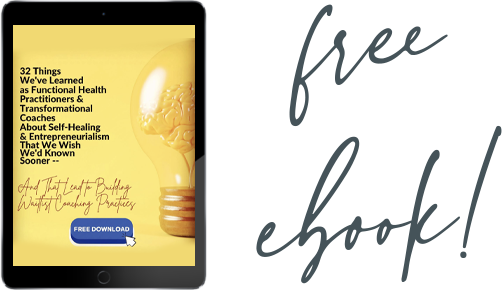3 May, 2017
Hormone Testing: Find Out Which Test Is Best

This is one of those moments where I wish I could go back in time and give some advice to my younger self. Instead of going on birth control pills to “fix” my issues like acne and irregular periods, I wish I simply had my hormones tested. Over the last six years I have become more informed about my health. I put priority on making myself as healthy as possible, in as natural a way as possible.
A couple of years ago I asked my primary doctor to run a hormone panel for me after being off the pill for about a year. I knew things were off and wanted to get a baseline so I could make the changes my body needed. The results came back and my doctor said everything looked “normal”. NORMAL!? I knew what I was feeling and the symptoms I was having were not normal. I knew deep down that things were not fine. From my experience as a dietitian I knew that any symptom is not normal Does any of this sound familiar to you? Unfortunately, it happens all too often. Women are treated based on test results and nothing else.
Don’t just treat the test results…treat the patient!
The problem with the initial hormone panel I had is pretty typical. The only hormones my doctor ordered was for estradiol, progesterone, and testosterone. This is fairly common practice and I see it all of the time. My blood was also drawn without any consideration for where I was in my cycle. Since hormones are constantly fluctuating, timing is key. Generally, hormone tests for women should be done around day 19-21 of her cycle. Keep reading to find out why.
This past year I finally got a proper hormone test and I found out much more information that made a lot more sense. I am now able to use this information to work on my journey towards better health. That is exactly what I want for my clients too – freedom from imbalanced hormones and unpleasant symptoms. It is possible!
What are Hormones?
Hormones are chemical messengers that tell other systems throughout your body what to do, how to do it, and when to do it. There are thousands of body processes that occur because of your hormones. This means that if one hormone is out of whack it might throw off other processes related to it, causing a domino effect. Hormones work together. When the correct amount of the right hormone is working at the right place and at the right time, you feel and look great!
How Do Hormones Work?
Without getting too complicated, hormones are secreted into your bloodstream via organs, glands, and cells. Think of a lock and key: the lock being a receptor and the key being a particular hormone. Once the hormone or hormones reach a specific target cell membrane it needs to fit into the receptor to unlock the mechanism.
Symptoms of Possible Hormone Imbalance
Remember, symptoms are NOT normal. They are usually your body’s way of telling you that something is off. Your body’s way of crying out for help so to speak.
Here are just a few of the common symptoms I see in my practice:
- breast swelling and pain
- depression
- feeling tired
- low libido
- anxiety
- headaches
- heavy periods
- recurring miscarriage
- migraines
- weight gain
- acne
- PCOS
- endometriosis
- fibroids
- PMS
- cysts
- sleep problems
- irregular periods
- PLUS MUCH MORE
Problems with Typical Hormone Testing
1.
Blood testing may not be the best route to take to get the most accurate picture of your hormone levels. It is common practice for doctors to have blood drawn to test your hormone levels. Blood tests can give an overall indication of hormonal imbalances, but they have their limitations because they measure hormones bound to blood proteins, which are inactive hormones. Blood is not an accurate reflection of the bioavailable hormones or the amount of hormone that is active in organs and tissues.
2.
It is not often considered where a woman is in her cycle at the time of testing. Your hormones estrogen, progesterone, and testosterone rise and fall throughout your cycle. During the first week, estrogen and progesterone are at their lowest levels. Estrogen continues to rise throughout your second week, with testosterone also beginning to rise during the latter part of the week. During the third week, estrogen typically takes a plunge for a few days before beginning to rise. Your progesterone also begins to rise around this time. Estrogen and progesterone will then fall during the last part of your cycle, if your egg hasn’t been fertilized, triggering the start of your period. If you don’t know where in the cycle you are during hormone testing then how can you know what levels are appropriate?

3.
We usually don’t get a full picture of hormones. Cortisol is rarely run in a standard hormone panel which is a big mistake. When it comes to testing cortisol levels, if blood was used, the blood can only test total cortisol and not the bioactive form. Even if cortisol was tested, typically blood draws are only performed once during the day. A minimum of four cortisol levels are ideal in order to see a clearer picture of your hormone levels. Just like sex hormones, cortisol is always rising and falling. You may have a normal morning cortisol but high or low afternoon or evening levels, which you won’t know without proper testing.
Cortisol is one of the steroid hormones and is made in the adrenal glands. During times of stress or blood sugar imbalance, your adrenals produce cortisol to help bring balance to your body. Cortisol and DHEA-S compete for the same precursor: pregnenolone (your “mother” hormone). Essentially when your body needs excess cortisol it can’t properly make DHEA-S. DHEA-S is also a precursor of the sex hormones: estrogen and testosterone. As a result, your sex hormones get thrown off without enough DHEA-S to make them. If poor adrenal function is preventing you from making proper sex hormones, wouldn’t you want to know so you could fix the root cause? Without a cortisol test we might just put on hormone supplements or medications when in fact it is our adrenals that are the problem.

Which Tests are Best?
If blood is not a great way to test hormones then what else is there? Two tests that I use in my practice are BioHealth and Dutch Test. Together we can decide which test is right for you. Here is a run down on why I see better results with these tests over traditional blood tests.
BioHealth Saliva Test
Saliva is one option when it comes to testing hormone levels. Saliva testing has been used in clinical research, including studies conducted at the National Institutes of Health (NIH) for more than 30 years.
Saliva testing is a step above blood testing but it is not my preferred testing method (see below). It is much more specific and correctly identifies the level of hormones at the cellular level, in contrast to a serum (blood) test, which measures the level of hormones circulating in the bloodstream. They are more accurate at predicting if hormones are moving out of the blood to receptor sites on tissues versus blood hormone tests.
You can also easily take four to six samples of saliva to assess your daily cortisol hormone levels. I used to use BioHealth for these saliva hormone tests until I found DUTCH.
The BEST Hormone Test (and my preferred test): Dutch Urine Test
The best option available right now and the one I run on my own clients is DUTCH Test. It stands for dried urine test for comprehensive hormones. This test is amazing and has a lot of the benefits of a saliva test but it goes above and way beyond with its ability to assess hormone metabolism. This means we are able to see how estrogen, progesterone, testosterone, and cortisol are metabolized (or made) – a measure of hormone production and breakdown. These metabolites are important to know because they tell us so much about our health. For example: specific estrogen metabolites have been associated with an increase in breast cancer risk while others have been deemed protective.
Elevations in hormone levels are often assumed to be due to increased hormonal production. In some scenarios, however, elevations may be due to decreased metabolism or clearance of a hormone. High levels of free hormone and reduced levels of metabolites imply that the elevation in free hormones may be caused by slow metabolism/clearance of these hormones. For example: cortisol may be low on your test but the cortisol metabolites might be elevated, indicating that your body is making cortisol but your body isn’t utilizing it properly.
Discovering how our bodies break down these hormones is extremely helpful in determining why symptoms are occurring, how to treat them, and how to rebalance the body’s natural release and utilization of hormones.
The DUTCH test also includes a marker for oxidative stress, which can indicate DNA damage in the body. It also checks melatonin levels which can provide a window into gut function, since much of the melatonin is made in the gut. They just recent added even more markers without changing the cost. They added six OAT (organic acid tests) including three neurotransmitter and three nutrient markers. Read all about these new additions in my post, 6 More Reasons to Love DUTCH Hormone Testing.
Hormones are very delicate yet essential for our bodies to function. One little thing gets thrown off and the whole system can come tumbling down. Fortunately, testing has improved greatly over the years and we can get a better understanding of what is happening on the inside. This gives us the knowledge and opportunity to get back on track and feel our best. Don’t wait! Test…don’t guess!
Are You Ready to Get Tested and Turn Your Health Around? Click The Button Below to Request a FREE 30 Minute Discovery Call…
As a Registered Dietitian certified in Stress and Hormones by Functional Diagnostic Nutrition, I help clients get proper testing, assist in the process of reading those results using clinical correlation (treating the patient and not just the test results), and give them the proper tools (diet, supplements, and lifestyle) to start the healing process.
















 80% of chronic dis-ease is rooted in stre
80% of chronic dis-ease is rooted in stre
 As
As 

I like that you describe hormones as chemical “messengers” that essentially tell the body how and when to do things. My wife will be going in for hormone testing sometime and I never really understood the function of them before now. I’ll have to remember that things such as depression and acne could be signs of hormonal imbalance, both of which have been plaguing her. Thanks for the post, it’s very informational and I hope it’ll help me help my wife.
I am happy you found value in this post. Let me know if I can help in anyway…I would be happy to have you in my heal your hormones program.
So if I am already on bhrt and having hard time getting them.adjusted rt just using blood testing would doing the Dutch test help my Dr get better idea of maybe where we need to adjust and if I am to hi or low due to what i am taking?
Yes DUTCH is amazing for making sure your bioidentical hormones are giving you what you need. Your doctor may not be familiar with the test so I do recommend finding someone that is trained in reading and understanding the test. This way you get the most out of the results. You also get a much better price on the test when you work through a DUTCH practitioner. Let me know if you need help with this! You can always e-mail me or use my contact page on the website. theorganicdietitian@gmail.com
Hello, I would like to take the Dutch test and then meet with you to interpret the results individually if possible. Are you able to meet with me about the results?
Hi Danelis- appreciate you reaching out. Unfortunately I don’t offer single tests and one off sessions. Healing requires so much more than just taking one lab. And as much as I love the DUTCH test and find it helpful at painting a picture we can’t get all the information we need from this one lab. I only work with clients in programs. If you are interested in diving deeper into your health and getting support then check out my Heal Your Gut for Good group program. You would have the opportunity to run the DUTCH in here as well as get more education, support, and be empowered to become your own best self healer addressing the mind, body, spirit connection. https://theorganicdietitian.thinkific.com/